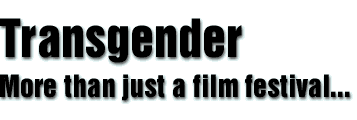|
 |
||
|
Mel Taylor talked with the director of the Third International Transgender Film Festival, Kam Wai Kui, and below discusses the impact of the festival and some of the issues facing the transgender community |
The First International Transgender Film Festival was held in 1997 at the newly opened Lux in Hoxton. It was the first such event in the world, and the idea of transgender activist and writer Zachary I. Nataf, who directed the first and second festival, and has curated this year's programme. There already existed a rich body of work which challenged notions of gender and sexual identity. From personal experience Zach recognised that there was a need within the established and growing transgender community to uncover and articulate individual and collective experiences.
The festival is organised by Alchemy Festival Productions, and run entirely by volunteers. This year it is co-directed by Kam Wai Kui and Annette Kennerley. Despite limited resources, the organisers have created a significant and challenging event, which is now beginning to grab the attention of the national press, and so bring the debates into the mainstream arena. The success and growth of this event reflects, and has contributed to, the increasing cultural and political significance of the transgender community, not only in Britain, but throughout the world.
Establishing a separate, independent festival has been crucial. In the early nineties the visible transgender movement became, in part, affiliated to or included within the lesbian, gay and bisexual movement. Many events and festivals were renamed to include transgender in their title. In one sense this is not surprising. As Kate Bornstein, transgender writer and performance artist, suggests, "the definition of gender in our culture includes the mandate of heterosexuality, so in fact every lesbian and gay man is transgressing gender". And as co-director, Kam Wai Kui, points out: "for many years lesbians and gays have been occupying the same spaces, and they will continue to do so. A lot of the transgender films have been shown at lesbian and gay film festivals, and I think it will continue."
However, whilst this space provided a starting point from which to increase visibility, it was not a long-term solution. Inclusion can be supportive and strengthening; but it can also be restrictive and limiting. By highlighting similarities and mutual concerns, important differences can be lost. Lesbians and gay men are defined by their sexual orientation, whereas transgenderists are not. A specifically transgender event provides a forum for work which may not be discovered, or even accepted, by other communities. Last year's festival included the first known porn-video made with only female-to-male actors. Work such as this might be difficult to screen elsewhere, but as Kam Wai Kui explains "It's just wonderful to show that these people who are problematised by society are doing the same as other communities"...
Thanks to: Annette Kennerly and Kam Wai Kui.
Links: http://www.tgfilmfest.co.uk
http://www.brandon.guggenheim.org
http://www.pfc.org.uk
Full article published in Filmwaves - Issue 9, Autumn 1999. Subscribe now!
